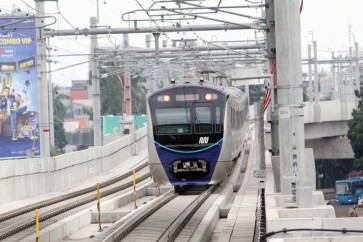WB paints gloomy picture of RI economy
Indonesiaâs economic growth is at risk of falling below 6 percent for the first time in more than two years as growth drivers such as domestic consumption, exports and investment are expected to slow partly due to higher inflation and global uncertainty, the World Bank has said
Change text size
Gift Premium Articles
to Anyone

I
ndonesia's economic growth is at risk of falling below 6 percent for the first time in more than two years as growth drivers such as domestic consumption, exports and investment are expected to slow partly due to higher inflation and global uncertainty, the World Bank has said.
The US-based organization cut its economic growth forecast for Indonesia to 5.9 percent this year from 6.2 percent earlier, arguing that 'the risk of a more pronounced slowdown is high' due to the rise in inflation stemming from the fuel price hike.
Prevailing global uncertainty might result in further weakening commodity prices, posing another significant risk given the importance of commodity-related activities for foreign currency earnings, corporate profits and investment activities, the World Bank said in its quarterly report released on Tuesday titled Adjusting to Pressure.
'Although monetary and fiscal policies have been responsive, other pressures are emerging, requiring readiness for further policy adjustments to safeguard macroeconomic stability and maintain Indonesia's growth momentum,' Ndiamé Diop, World Bank lead economist for Indonesia, said on Tuesday.
Indonesia has maintained economic growth of above 6 percent for 10 consecutive quarters since October 2010, thanks to strong domestic consumption that accounts for almost 60 percent of its gross domestic product (GDP).
The government has targeted the economy to grow 6.3 percent this year. However, economists have said that such a target might be difficult to achieve, pointing to the fact that Indonesia only expanded 6.02 percent in the first quarter this year, the lowest level in more than two years.
The slowdown occurred amid solid economic growth recorded by its neighbors, notably the Philippines, which in the first quarter of this year posted 7.8 percent economic growth ' overtaking China as the region's fastest-growing economy.
Apart from growth, the country's external position was also under pressure as intense selling in capital markets was predicted to continue, consequently limiting fund inflows coming into the country, the World Bank said.
Any disruption of inflows would exert pressure on the country's balance of payments, which already recorded a staggering US$6.6 billion deficit in the first quarter this year.
If the deficit in the balance of payments continued in the upcoming quarters, it would create 'very strong pressure on external financing needs', Diop argued.
But, the World Bank expressed little concern over the depreciation trend of the rupiah. While the rupiah has depreciated on a sustained basis against the US dollar in nominal terms since mid-2011, the currency had in fact appreciated on a trade-weighted basis and in real terms since the start of 2013. The rupiah actually weakened the least among other currencies in the region, the Washington-based lender noted.
'Many of the government's objectives can be served better by a weakening rupiah rather than [forcing] a stronger rupiah,' Diop said, arguing that a weak rupiah could boost Indonesia's competitiveness in its manufacturing industries, especially those dealing with exports.
Deputy Finance Minister Mahendra Siregar highlighted the importance of maintaining strong economic fundamentals to ensure that any sudden shock in the global economy would not trigger volatile swings for the rupiah.
'In the end, market operations and intervention might not be able to improve the position of a currency. The only way to maintain a stable exchange rate is through good, sustainable economic management,' he said on Tuesday.
Indonesia would be able to grow at least above 6 percent this year, the deputy minister added, vowing to expedite economic reforms to ensure that the 2013 growth target of 6.3 percent could be achieved.









